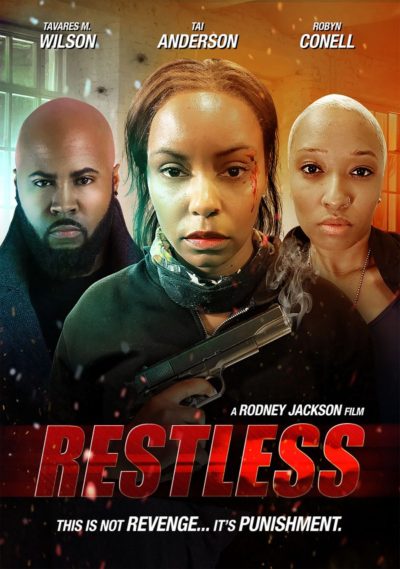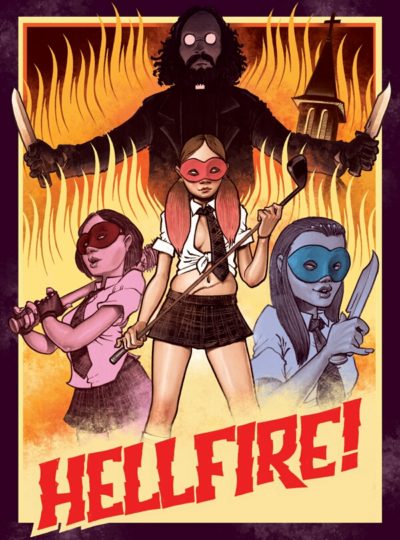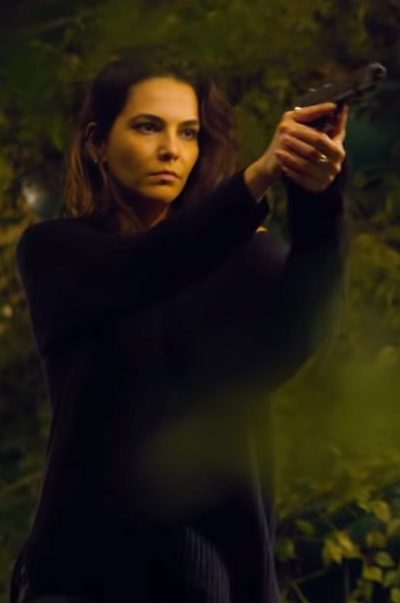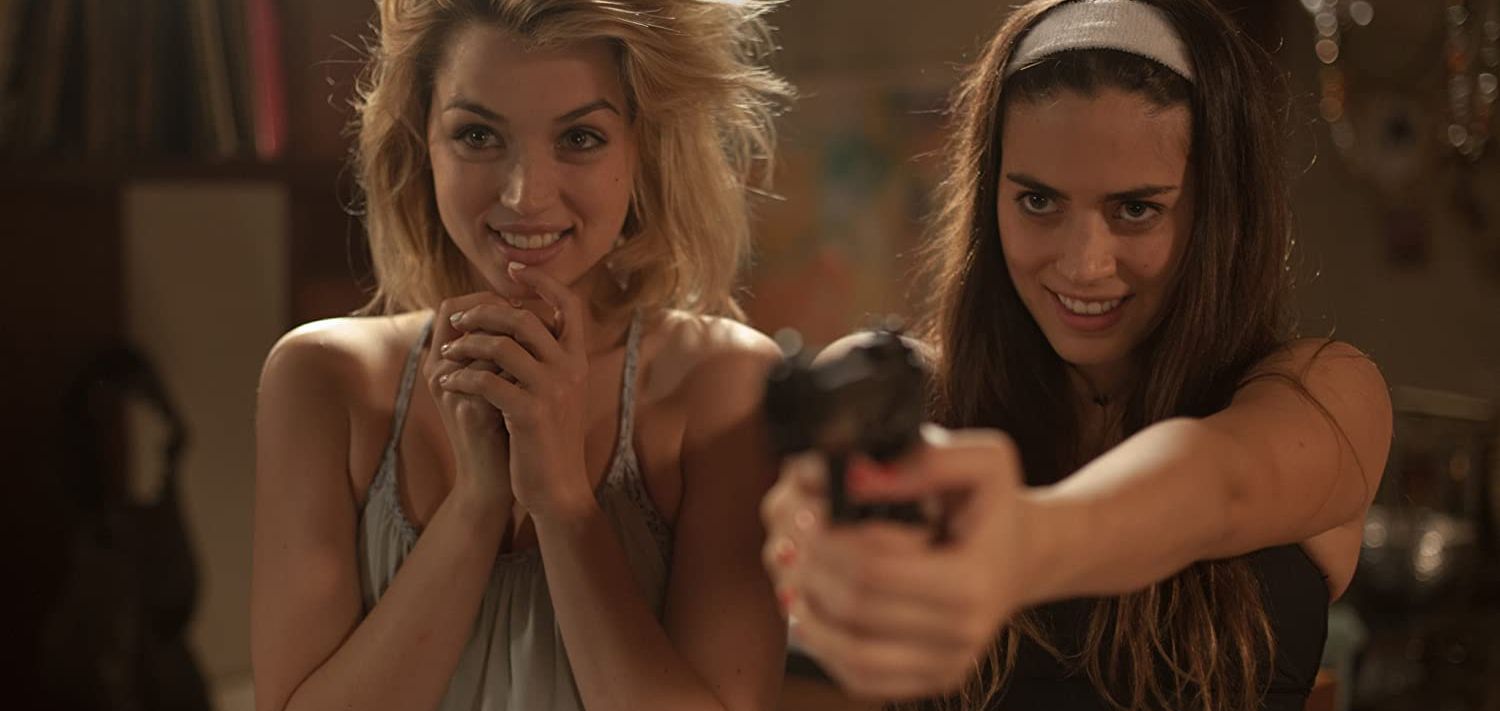★★
“Mom on a mission”
 Single mother Naomi Harper (Anderson) is devoted to her son, and he to her. In an effort to help Mom make ends meet, he gets a job working for notorious local “businessman”, Noah Oliver (Wilson). When her child turns up dead, Naomi is sure that Oliver had something to do with it. The police, in particular Detectives Emory Kota (Conell) and August Hayes ( Jeziorski), don’t necessarily disagree, but their hands are tied. This is partly due to a shortage of actionable evidence, partly because Oliver’s connections run deep into the local political and judicial establishment in Conyers, Georgia, making it impossible to take action against him. Well, at least officially. Naomi has no such limitations, and this apparently mild-mannered loan officer has a background that may prove of help.
Single mother Naomi Harper (Anderson) is devoted to her son, and he to her. In an effort to help Mom make ends meet, he gets a job working for notorious local “businessman”, Noah Oliver (Wilson). When her child turns up dead, Naomi is sure that Oliver had something to do with it. The police, in particular Detectives Emory Kota (Conell) and August Hayes ( Jeziorski), don’t necessarily disagree, but their hands are tied. This is partly due to a shortage of actionable evidence, partly because Oliver’s connections run deep into the local political and judicial establishment in Conyers, Georgia, making it impossible to take action against him. Well, at least officially. Naomi has no such limitations, and this apparently mild-mannered loan officer has a background that may prove of help.
The script here isn’t bad. There are a number of interesting angles, such as the parallel actions of a vigilante, working in same area as Naomi, and targetting those who consider themselves above the law. Naomi isn’t the only strong female character either, with Det. Kota frustrated by the restrictions of her position. Then there’s Sophia (Rachel Burger), Oliver’s right-hand ma… er, woman, who proves capable of handling herself physically as well. Though I probably would have been more impressed had Naomi not done that crappy, gangsta “holding the gun at an angle” thing, as she headed towards her final confrontation with Oliver. Nobody with experience and an interest in being taken seriously would be caught dead doing that.
However, the problems here are most readily apparent in the resources here. Or, to be more accurate, the lack thereof. Even though the film tries to work within the budgetary limitations, these are so severe, they can’t be hidden. For instance, scenes which are supposed to take place in a police station, very clearly don’t. Indeed, there’s very little effort to make it look like anything, except a bare, empty room. The same goes for a number of other locations, where the bare minimum appears to have been done in terms of set dressing. Hardly less glaring are the plugs for local venue, Triplz Lounge. I’m sure it’s a lovely place.
Another weakness is that most of the actors don’t appear to fit their characters. Wilson is probably the worst offender, never being convincing as a mob boss – he’s just not intimidating or threatening enough. But to a lesser extent, the same goes for Anderson. Despite copious flashbacks to a time when her son was alive, she rarely seemed like a distraught mother, pushed into unthinkable acts by the callous and indifferent hand of fate. She’s not a bad actress, competent enough from a technical point of view. There just wasn’t any reason for the viewer to pay the emotional buy-in to her portrayal. I’d not mind seeing what Jackson and his team could do with more money, and I’ve certainly seen worse. Here though, the challenges prove just too much for them to overcome.
Dir: Rodney Jackson
Star: Tai Anderson, Tavares M. Wilson, Robyn Conell, Will Jeziorski








 This is the kind of film which makes for very uncomfortable date night viewing, simply because the situation presented is likely to lead to awkward conversations. Happily married architect Evan Webber (Reeves) has the house to himself for the weekend, his wife having gone with their two kids to the seaside, leaving him free to work on a project. A stormy night ensues, until a knock at the door, and he finds two lost young women, Genesis (Izzo) and Bel (de Armas), shivering on the doorstep. He can hardly make them stay there, so lets them in. Almost immediately, something is wrong, though initially this falls into the “Too good to be true” category. For they are nymphomaniac flight attendants, and inevitably – though after a credible struggle – Evan succumbs to their relentless charms.
This is the kind of film which makes for very uncomfortable date night viewing, simply because the situation presented is likely to lead to awkward conversations. Happily married architect Evan Webber (Reeves) has the house to himself for the weekend, his wife having gone with their two kids to the seaside, leaving him free to work on a project. A stormy night ensues, until a knock at the door, and he finds two lost young women, Genesis (Izzo) and Bel (de Armas), shivering on the doorstep. He can hardly make them stay there, so lets them in. Almost immediately, something is wrong, though initially this falls into the “Too good to be true” category. For they are nymphomaniac flight attendants, and inevitably – though after a credible struggle – Evan succumbs to their relentless charms. There are times when I am bracing myself, going into a movie. Here’s the synopsis for this one: “A transgender teenage girl on summer vacation in Los Angeles fights to survive after she falls in with four queer feminist vampires, who try to rid the city’s streets of predatory men.” Given my long-standing aversion to message movies, this seemed like 90 minutes of my worst nightmare. What had I let myself in for? But this proved to be surprisingly accessible – even for those of us who are neither transgender nor queer, and are enrolled in the Camille Paglia school of feminism.
There are times when I am bracing myself, going into a movie. Here’s the synopsis for this one: “A transgender teenage girl on summer vacation in Los Angeles fights to survive after she falls in with four queer feminist vampires, who try to rid the city’s streets of predatory men.” Given my long-standing aversion to message movies, this seemed like 90 minutes of my worst nightmare. What had I let myself in for? But this proved to be surprisingly accessible – even for those of us who are neither transgender nor queer, and are enrolled in the Camille Paglia school of feminism. This was likely not going to qualify for inclusion here, until a twist in the final 15 minutes. Up until that point, it had been a largely irritating saga, that was considerably more horror than action heroine – and not even good horror at that. I’m still significantly unconvinced about the quality, but must grudgingly admit, this was a twist which I did not particularly see coming (though there is a large clue dropped near the beginning). Three gal-pals, Tamara (Betham), Maddy (Taylor-Compton) and Brooke (Allbright) head for a weekend’s lakeside R&R. On the way, Tamara’s car runs out of fuel, and she encounters the local creeps, but eventually arrives, and joins the other two in scamming drinks out of horny guys.
This was likely not going to qualify for inclusion here, until a twist in the final 15 minutes. Up until that point, it had been a largely irritating saga, that was considerably more horror than action heroine – and not even good horror at that. I’m still significantly unconvinced about the quality, but must grudgingly admit, this was a twist which I did not particularly see coming (though there is a large clue dropped near the beginning). Three gal-pals, Tamara (Betham), Maddy (Taylor-Compton) and Brooke (Allbright) head for a weekend’s lakeside R&R. On the way, Tamara’s car runs out of fuel, and she encounters the local creeps, but eventually arrives, and joins the other two in scamming drinks out of horny guys. Four women run a charitable agency in Texas, helping single mothers track down and obtain child support payments from deadbeat dads. However, they don’t limit themselves to the simple serving of legal papers. The women adopt a more… hands-on approach, shall we say, first luring their targets in with the promise of sex, then threatening them at gunpoint, to make sure they pay up. For obvious reasons, the cops soon take interest in this string of unusual armed robberies. Meanwhile, the city’s white mayor, is dealing with a domestic crisis of her own, thanks to her daughter having had a child by (gasp!) a black man.
Four women run a charitable agency in Texas, helping single mothers track down and obtain child support payments from deadbeat dads. However, they don’t limit themselves to the simple serving of legal papers. The women adopt a more… hands-on approach, shall we say, first luring their targets in with the promise of sex, then threatening them at gunpoint, to make sure they pay up. For obvious reasons, the cops soon take interest in this string of unusual armed robberies. Meanwhile, the city’s white mayor, is dealing with a domestic crisis of her own, thanks to her daughter having had a child by (gasp!) a black man.
 The above is the Polish for “seven”, and in the first half-hour, you’ll be forgiven for thinking that’s what you’re watching: a Polish knock-off of David Fincher’s Se7en. Homicide cop Helena Rus (Kożuchowska) is struggling to come to terms with life, after her boyfriend is killed by a drunk-driver and, for political reasons, the criminal is allowed to go free. A welcome distraction comes in the shape of a series of ritualistic murders: every day at 6 pm, a body turns up on the streets of Wroclaw. The victims have been killed in strange and unusual ways – the first, for example, is sewn inside a cow-hide, which shrinks as it dries, crushing the victim to death. Each has a word branded into their flesh, such as “Degenerate”.
The above is the Polish for “seven”, and in the first half-hour, you’ll be forgiven for thinking that’s what you’re watching: a Polish knock-off of David Fincher’s Se7en. Homicide cop Helena Rus (Kożuchowska) is struggling to come to terms with life, after her boyfriend is killed by a drunk-driver and, for political reasons, the criminal is allowed to go free. A welcome distraction comes in the shape of a series of ritualistic murders: every day at 6 pm, a body turns up on the streets of Wroclaw. The victims have been killed in strange and unusual ways – the first, for example, is sewn inside a cow-hide, which shrinks as it dries, crushing the victim to death. Each has a word branded into their flesh, such as “Degenerate”. This strong Indian tale of revenge and (step)mother love was, sadly, the last major appearance for its star. Sridevi accidentally drowned in a Dubai hotel, a few months after the film was released. But it’s a wonderful monument to her talent. She plays Devki Sabarwal, a biology teacher who is having trouble in the relationship with her teenage step-daugher, Arya (Ali). But everything changes after Arya is abducted while leaving a party, raped and beaten, then thrown into a roadside ditch. The fact Arya had been drinking is used to discredit her testimony, and the absence of forensic evidence helps her attackers walk free. Blood relation or not, Devki isn’t having that. With the help of private eye DK (Siddiqui), she starts to impose her own kind of justice, despite the increasing suspicions of Detective Francis (Khanna).
This strong Indian tale of revenge and (step)mother love was, sadly, the last major appearance for its star. Sridevi accidentally drowned in a Dubai hotel, a few months after the film was released. But it’s a wonderful monument to her talent. She plays Devki Sabarwal, a biology teacher who is having trouble in the relationship with her teenage step-daugher, Arya (Ali). But everything changes after Arya is abducted while leaving a party, raped and beaten, then thrown into a roadside ditch. The fact Arya had been drinking is used to discredit her testimony, and the absence of forensic evidence helps her attackers walk free. Blood relation or not, Devki isn’t having that. With the help of private eye DK (Siddiqui), she starts to impose her own kind of justice, despite the increasing suspicions of Detective Francis (Khanna).